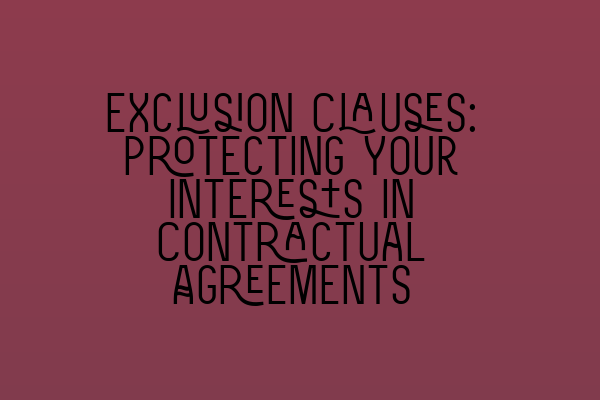Exclusion Clauses: Protecting Your Interests in Contractual Agreements
In the world of contract law, it is essential to protect your interests and mitigate potential risks. One tool that can be extremely valuable in achieving this goal is the inclusion of exclusion clauses in your contractual agreements. These clauses, when properly drafted and implemented, can help you limit your liability and allocate risks between parties involved. In this article, we will explore the importance of exclusion clauses and provide you with valuable insights on how to effectively include them in your contracts.
What are exclusion clauses?
Exclusion clauses, also known as exemption clauses or limitation clauses, are contractual provisions that aim to exclude, restrict or limit the liability of one party in the event of a breach or failure to meet contractual obligations. These clauses allocate risks and responsibilities between the parties involved, providing a level of protection and assurance.
Why are exclusion clauses important?
Exclusion clauses play a crucial role in contract law as they help parties to negotiate and determine the extent of their responsibilities and liabilities. By clearly outlining the scope of liability, both parties are aware of the potential risks and can plan accordingly. This can be particularly vital in complex business transactions where there may be multiple parties and significant financial implications.
Key types of exclusion clauses
1. Exclusion of liability for negligence: This type of exclusion clause seeks to absolve one party from any liability arising from their negligence. It is important to note that such clauses may be subject to scrutiny by the courts, particularly if they are considered unfair or unreasonable.
2. Exclusion of consequential damages: Consequential damages are indirect losses or damages that arise as a result of a breach of contract. Exclusion clauses can be used to limit or exclude liability for these types of damages.
3. Exclusion of implied terms: Every contract has certain implied terms imposed by law. Exclusion clauses can be used to exclude or modify the applicability of these implied terms, although not all implied terms can be excluded.
4. Exclusion of liability for third-party claims: In some cases, it may be necessary to exclude liability for claims brought by third parties who are not party to the contract. This can protect parties from unforeseen circumstances and claims that may arise from external sources.
Drafting effective exclusion clauses
To ensure that your exclusion clauses are effective and enforceable, careful drafting is essential. Here are some key considerations to keep in mind:
1. Clear and unambiguous language: The language used in the exclusion clause should be clear, precise, and free from any ambiguity. Ambiguous or uncertain language may prevent the exclusion clause from being enforced.
2. Reasonableness: The Unfair Contract Terms Act 1977 and the Consumer Rights Act 2015 impose certain requirements for the reasonableness of exclusion clauses. When drafting your clauses, it is crucial to ensure that they are fair and reasonable in the circumstances, taking into account the potential harm and loss suffered by the other party.
3. Conspicuous placement and awareness: It is important to draw attention to the existence of exclusion clauses within the contract. They should be placed prominently, and the other party should have full knowledge of their presence and implications. Consider highlighting them in a separate section or using bold fonts.
4. Consideration of statutory limitations: Certain statutory protections may limit the enforceability of exclusion clauses. For example, in some jurisdictions, consumer contracts may be subject to specific regulations that restrict the use and scope of exclusion clauses.
Conclusion
Exclusion clauses are valuable tools that can help protect your interests and limit your liability in contractual agreements. However, it is important to draft and implement them carefully to ensure their effectiveness and enforceability. By understanding the different types of exclusion clauses and following the key considerations outlined above, you can enhance your legal protections and minimize potential risks in your contractual relationships.
For more information and resources related to SQE Contract Law, we recommend these articles:
1. SQE 1 Practice Exam Questions
2. SQE 1 Practice Mocks FLK1 FLK2
3. SQE 2 Preparation Courses
4. SQE 1 Preparation Courses
5. SRA SQE Exam Dates
Remember, it is always prudent to seek professional legal advice when dealing with complex contractual matters. A solicitor with expertise in contract law can provide personalized guidance tailored to your specific situation.
